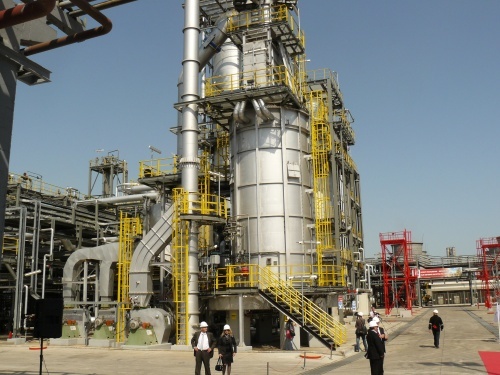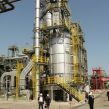
LUKoil Under Pressure In Bulgaria
Publication: Eurasia Daily Monitor Volume: 8 Issue: 167
By:

Russia’s energy interests in Bulgaria have been under scrutiny since the center-right government of Boyko Borissov took office in July 2009. At the beginning of his mandate, Borisov pledged to review all pending Russian energy contracts signed by the previous Socialist government. Two years later, the Burgas-Alexandropolis oil pipeline is effectively suspended, the Belene nuclear power plant project is disputed in court, and the South Stream gas pipeline project is sidelined by Sofia’s resolute support for the Nabucco gas project. The latest dispute of the Bulgarian government with LUKoil increased tensions between Sofia and Moscow.
The Bulgarian government has taken harsh measures against Russia’s second largest oil producer LUKoil for failing to comply with local tax regulations. On July 26, the country’s Customs Agency stripped LUKoil Bulgaria of the license to operate its excise duty fuel storage facility and oil-importing terminal near Burgas on the Black Sea. The decision was provoked by the company’s failure to install mandatory electronic measuring devices transmitting data to the Customs Agency. The license cancelation threatened a temporary shutdown of the largest oil refinery in the Balkans with production capacity of 142,000 barrels per day.
The Administrative Court temporarily restored LUKoil’s license on August 2, arguing that the oil producer’s inability to sell fuel will affect key sectors of the Bulgarian economy. The dispute between the oil company and the Customs Agency will be resolved by the Sofia Administrative Court in a procedure that will take over a year, giving LUKoil time to install the required measuring equipment. However, LUKoil wants to use all possible legal procedures to postpone the adjudication of the case (Dnevnik, September 1).
LUKoil’s license suspension came after a Customs Agency probe into its refinery, which confirmed gross excise duty violations by the company (Trud, 24 Hours, Dnevnik, Duma, Standard, Sega, July 28). Customs officials said that the refinery registered losses for two consecutive years and did to pay profit taxes for that period. The Customs Agency discovered that the LUKoil-related company “Litasko Bulgaria,” registered in Switzerland, controls the refinery’s imports of crude oil and its fuel exports. Large quantities of exports are going to offshore firms raising concerns that some of the fuel might be re-entering the Bulgarian market without payment of excise duty (Bulgarian National Radio, August21). The Customs Agency’s inquiry was followed by an audit by the Bulgarian Revenue Agency at the oil refinery and the trade company “LUKoil Bulgaria”(Nova TV, August 16). The Bulgarian Anti-Trust Commission also launched an anti-monopoly probe at the LUKoil companies in Bulgaria to find out whether a fuel cartel is operating on the Bulgarian market (Mediapool.bg, August 3).
Prime Minister Borissov supported the Customs Agency’s decision to suspend LUKoil’s license stating that small and large companies are equal before the law and LUKoil had received a warning to comply with national excise duty requirements months ago (Trud, 24 Hours, Standard, July 29). The move indicated that the government was taking a more assertive position regarding Bulgaria’s energy dependence on Russia, especially with regard to LUKoil. Bulgarian opposition leaders praised the government’s courage in standing up to Moscow by confronting LUKoil’s monopoly on the Bulgarian fuel market.
The Russian media described the incident as a blow against Russia by the Bulgarian government, whose Prime Minister had evidently decided to abandon Russian energy projects in the country (Noviy Region, July 24). According to Izvestiya, Bulgaria is becoming an increasingly unwelcoming country for Russian business, pointing out that Russia’s Transneft has been unable to obtain permission to build the Burgas-Alexandropolis oil pipeline and Atomstroyproect has problems with constructing the Belene nuclear power plant (Izvestiya, August 1). Russian experts even see attempts by “the geopolitical opponents of Russia to oust Moscow out of the Balkans” (Noviy Region, August 1).
The Bulgarian public firmly approves the tough stand of its government against a Russian oil company that blatantly disregarded the law. The popularity of Prime Minister Borissov and Financial Minister Simeon Dyankov increased significantly, an important gain for the ruling party two months before the presidential and local elections (Trud, Dnevnik, Duma, August 5).
In the midst of the tax scandal and subsequent monopoly investigations, US Ambassador James Warlik paid a visit to the LUKoil Neftohim Burgas refinery that sparked public criticism. Ambassador Warlik reportedly praised the company as a reliable fuel supplier and the largest private employer in the country, contributing to the development of Bulgaria’s economy (mediapool.bg, August 26, novinite.com, August27). Although he later stated that the visit was routine and had no relation to Washington’s “reset policy” with Moscow, analysts consider his appearance at the Burgas refinery as primarily a demonstration of support for American business interests linked with LUKoil (mediapool.bg, August 27; Kapital, September 3).
The standoff between the Bulgarian government and LUKoil may eventually force the oil company to conduct business in line with Bulgarian laws. Such an outcome would demonstrate that Sofia’s position toward Russian energy projects is not necessarily directed against Russia, but aims to counter any monopolies on the energy market and improve business practices. LUKoil’s CEO Vagit Alekperov downplayed the conflict with the Bulgarian government as a “mutual misunderstanding” and was quick to announce that the company would continue investing in Bulgaria. LUKoil promised $16 billion worth of investments to upgrade its existing facilities, bolster its financial metrics, and ramp up oil and gas exploration activities in the next ten years (Dnevnik.bg, September 4).




